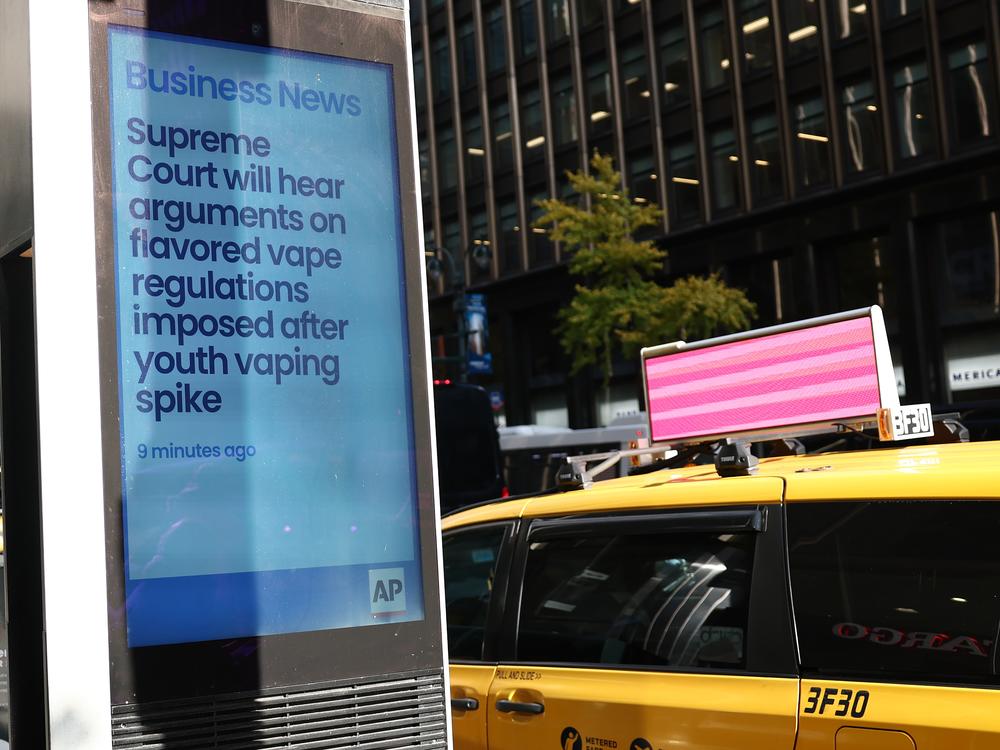Section Branding
Header Content
At Supreme Court, vaping may be frowned upon, but that could change with Trump
Primary Content
At the Supreme Court on Monday, the justices seemed skeptical about challenges brought by the vaping industry to regulations put in place by the Food and Drug Administration.
Vaping is the tobacco alternative that is quite the rage among middle and high school kids, but also can help some adult smokers wean themselves off more damaging tobacco products, mainly cigarettes.
If you don't know much about vaping, be assured that teenagers do. For the uninitiated in recreational stimulants, vaping is the inhaling of an aerosol mist from an electronic cigarette or similar device, which heats up a nicotine liquid to create a vapor that looks like smoke. It's an alternative that helps some smokers get off more damaging tobacco cigarettes, but it's also a product that's popular with middle and high-school kids. In 2023 over 2.1 million young people, including 10% of high school students, reported e-cigarette use and of those, more than a quarter reported daily vaping.
The focal point of the case is 2009 law enacted by Congress that gives the Food and Drug Administration a mandate to curb the availability of nicotine products for minors. In the years since then, Congress has strengthened that mandate and the FDA has made it all but impossible for vaping companies to sell their products using flavors that appeal to kids, flavors like jimmy-the-juiceman-peachy strawberry, rainbow road, and mother's milk and cookies. The companies contend that the FDA has acted in an arbitrary manner, effectively setting standards that are a moving target.
Arguments at the court
At the Supreme Court on Monday, the government's lawyer told the justices that Congress itself specified that flavored cigarettes and flavored vaping products have to meet a high bar because they particularly appeal to minors. Under the statute, a company must show its product is more likely to get adults off of tobacco cigarettes, and less likely to be used by under-age kids.
To date, only 27 vaping products have been approved, out of hundreds of thousands of submissions, largely because the agency concluded that there was no way to allow flavored e-cigarettes to be marketed without harming large numbers of children.
In the Supreme Court chamber on Monday, Chief Justice John Roberts asked Deputy Solicitor General Curtis Gannon, the government's lawyer, whether the government has "an obligation to tell people what they have to do to comply with your regulation."
Gannon replied that the FDA gave these vaping businesses fair notice that their business model is a "risky" one. As to the evidence the companies presented, "they were barking up the right tree," said Gannon, but "they didn't have sufficient scientific evidence" to satisfy the requirements in the statute.
Gannon noted that Congress was concerned about the fact that most people who become addicted to nicotine start when they are under age, "at a time when the adolescent brain is particularly vulnerable to the effects of nicotine." Or as Justice Ketanji Brown Jackson put it in referring to the statute, "This is not a discretionary call of the FDA."
Pressed by some of the conservative justices, Gannon pointed out that the agency approved not only tobacco flavored e-cigarettes, but most recently it approved e-cigarettes that are menthol flavored. The agency justified its decision on grounds that many smokers like the menthol taste, and menthol e-cigarettes deliver less damaging nicotine, and are more helpful for some adults seeking to wean themselves from the nicotine habit.
Lawyer Eric Heyer, representing the vaping companies, told the justices that without the approval of more flavors, many small vaping companies will be forced to shut their doors. But Justice Elena Kagan replied that "the difficulty with that, and the FDA I think has tried to document this, is that blueberry vapes are very appealing to 16-year-olds, not 40-year-olds."
Faced with the court's doubts, Heyer pointed out that once Donald Trump becomes president in January, the FDA's policy could change. With a new administration coming in, Heyer observed, "the President-elect is on record saying, 'I'm going to save flavored vapes,' we don't know exactly what that's going to look like."
A decision in the case is expected by summer.

